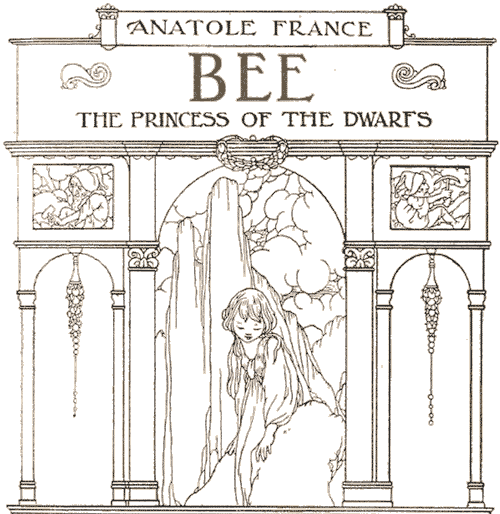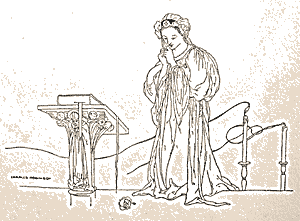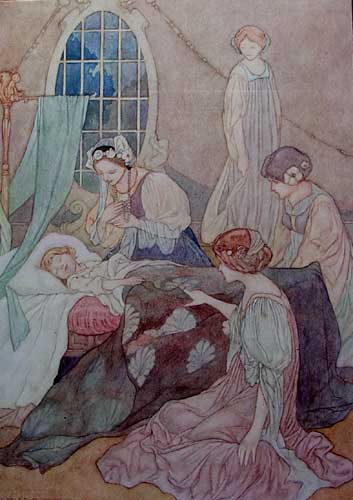| |

Chapter 1
Settling on her golden hair a hood spread with pearls and tying round
her waist the widow’s girdle, the Countess of the White Moor entered
the chapel where she  prayed
each day for the soul of her husband, killed by an Irish giant in single
combat. prayed
each day for the soul of her husband, killed by an Irish giant in single
combat.
That day she saw, on the cushion of her praying-stool, a white rose. At
the site of it she turned pale and her eyes grew dim; she threw her head
back and wrung her hands. For she knew that when a Countess of White Moor
must die she finds a white rose on her stool.
Knowing that the time had come for her to leave this world, where she
had been within such a short space of time a wife, a mother, and a widow,
she went to her room, where slept her son George, guarded by waiting women.
He was three years old; his long eyelashes threw a pretty shade on his
cheeks, and his mouth was like a flower. Seeing how small he was and how
young, she began to cry.
“My little boy,” she said in a faint voice, “my dear
little boy, you will never have known me, and I shall never again see
myself in your sweet eyes. Yet I fed you with my own milk, so as to be
really your mother, and I have refused to marry the greatest knights for
your sake.”
She kissed the locket in which there was a portrait of herself and a lock
of her hair, and put it around her sons neck. Then a mothers tear fell
on her sons cheek, and he began to move in his cradle and rub his eyes
with his little fists. But the Countess turned her head away and fled
from the room. Her own eyes were soon to close forever; how could they
bear to look into those two adorable eyes where the light of understanding
had just begun to dawn?
She had a horse saddled and rode to the castle of Clarides, followed by
her squire, Freeheart.
The Duchess of the Clarides kissed the Countess of White Moor: “What
good chance has brought you here, my dear?”
“It is an evil chance that has brought me here; listen, dearest.
We were married within a few years of each other, and we became widows
of a similar misfortune. In these times of chivalry the best die soonest,
and only monks live long. When you became a mother I had already been
one for two years. Your daughter Bee is as beautiful as day, and nothing
can be said against my son George. I like you and you like me. For I must
tell you I have found a white rose on the cushion of my stool. I am going
to die. I leave my son to you.”
The Duchess was aware of the news that a white rose brings to the ladies
of the House of the White Moor.
She began to cry, and promised in her tears to bring up Bee and George
as sister and brother, and not to give anything to one without giving
half to the other. Then the two ladies put their arms around each other,
and went to the cradle where little Bee slept under light blue curtains,
as blue as the sky. Without opening her eyes she mover her little arms,
and as she opened her fingers five small pink beams appeared to come out
of each sleeve.
“He will defend her,” said the mother of George. “And
she will love him,” the mother of Bee answered. “She will
love him,” a small, clear voice repeated.
The Duchess recognised it as that of a spirit that had long lived under
the hearthstone.

On her return to her manor the Lady of the White Moor divided her jewels
among her maids, and, having anointed herself with odorous essences and
put on her most beautiful clothes to honour that body which will rise
again on the Day of Judgement, she laid herself down on the bed and went
to sleep forever.
Next Chapter
|
